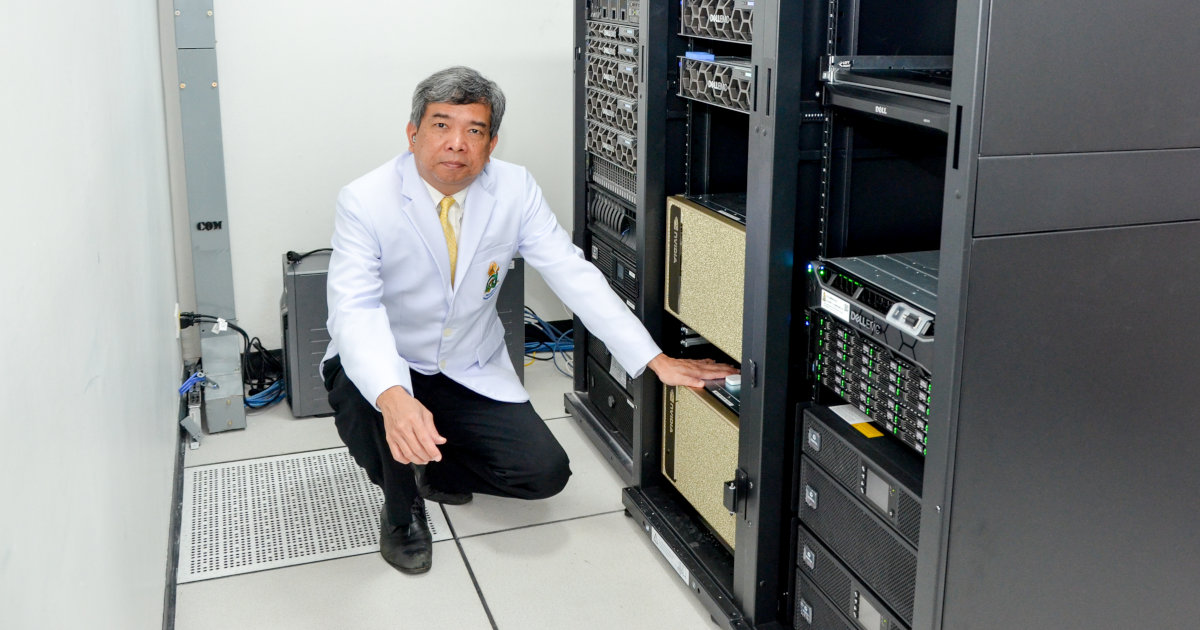
Thailand’s largest government hospital, Siriraj Hospital, which has more than 2,500 beds and caters to over 8,000 outpatients daily, will be the first hospital in Southeast Asia to deploy two NVIDIA DGX A100 systems for medical research and clinical applications. Officially launched in May 2020, the NVIDIA DGX A100 is the world’s first AI system built on the NVIDIA A100 Tensor Core GPU.
Siriraj Hospital is the university hospital of Mahidol University, whose Faculty of Medicine focuses on research, medicine and healthcare.
WHY IT MATTERS
The hospital’s radiology department is the first in Thailand to explore research and clinical application of AI on radiology images, including plain radiography, computed tomography (CT), magnetic resonance imaging (MRI), and ultrasonography.
Each day, the hospital collects 1,000 to 2,000 CT scan images and 500 to 1,000 MRI images for each patient. Multiply this by the 200 CT studies and 50 to 60 MRI studies each day and the amount of data is massive, making it difficult for radiologists to analyze and interpret in a timely manner required for
clinical efficiency.
“We have to focus on image classification to pick up the possible lesions among the vast number of images to help radiologists interpret the data. The volumetric measurement of organ and tumour on initial evaluation and follow-up are also a time-consuming process that requires manual drawing,” said Associate Professor Trongtum Thongdee of Radiology Department, Faculty of Medicine Siriraj Hospital, Mahidol University.
Siriraj Hospital leveraged AI in a solution that includes two NVIDIA DGX A100 systems, two workstations with NVIDIA V100 GPUs, six workstations with NVIDIA P6000 GPUs, as well as NVIDIA Clara Deploy and Train, CUDA, cuDNN, and TensorRT.
THE LARGER TREND
Earlier in May, the AI computing company announced a major expansion of its Clara healthcare platform with new software and tools to help healthcare researchers, technology solutions providers and hospitals tackle the COVID-19 pandemic faster, Healthcare IT News reported.
Siriraj Hospital is one of the eight Thai hospitals onboard the HIMSS Thailand National Digital Healthcare Workforce Development Initiative (WDI), which was officially launched in October 2019. The initiative sees the development of a three-year work plan to address the demand of patients for digital healthcare services in light of the Thailand 4.0 digitization journey, as well as healthcare tourism being one of the key economy drivers.
ON THE RECORD
“Training a 3D dataset with NVIDIA V100 takes just two days compared to 80 days with a CPU. The GPU is 40x faster and accuracy is increased. The CPU is not practical in research and clinical applications,” said Associate Professor Thongdee. “Furthermore, because of the high throughput of NVIDIA GPUs, clinical workflows can proceed smoothly without any bottlenecks. In emergency situations, faster interpretation of images can help doctors make better treatment decisions to save patients’ lives.”
“NVIDIA Clara is enabling hospitals to innovate and accelerate the journey to precision medicine,” said Dennis Ang, Director of Enterprise Business for the SEA and ANZ Region at NVIDIA. “The decision by Siriraj Hospital to invest in an NVIDIA-based AI solution empowers its radiologists to make faster and more accurate decisions that in turn will save more lives, as well as create a blueprint that healthcare facilities in the region can use to adopt leading-edge technologies that will dramatically improve patient care and outcomes.”
